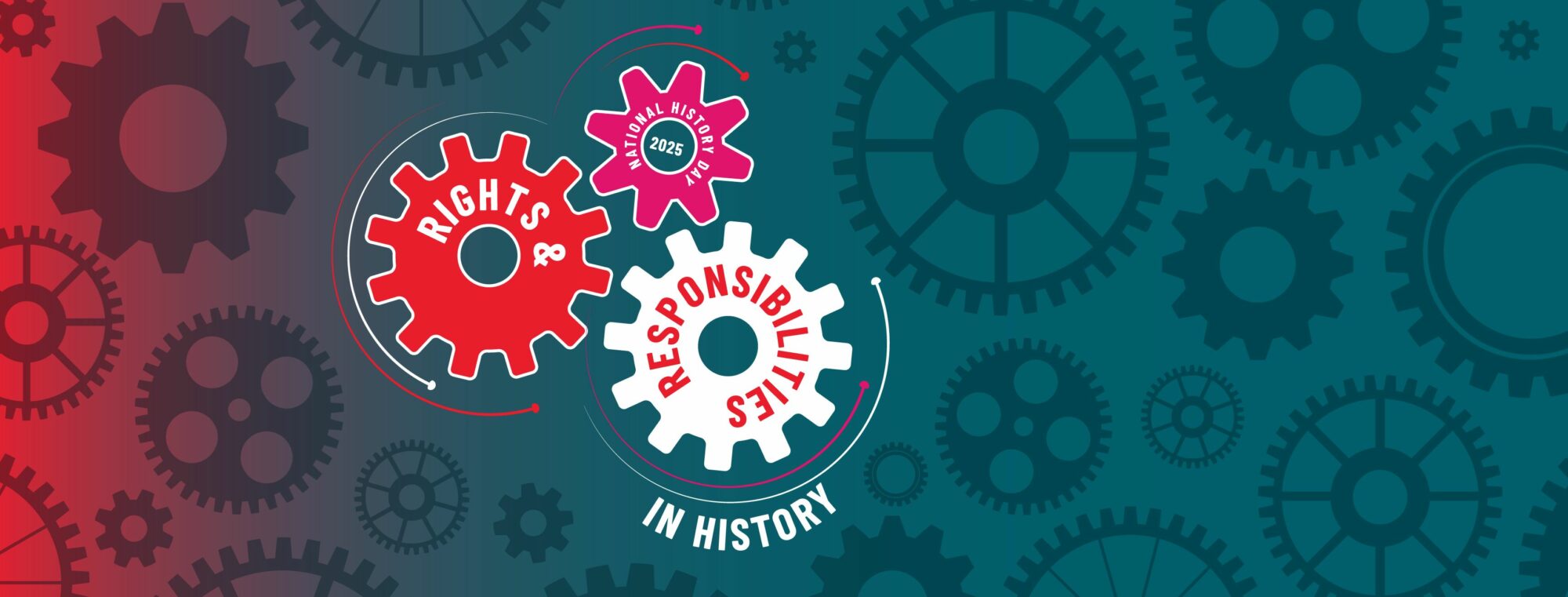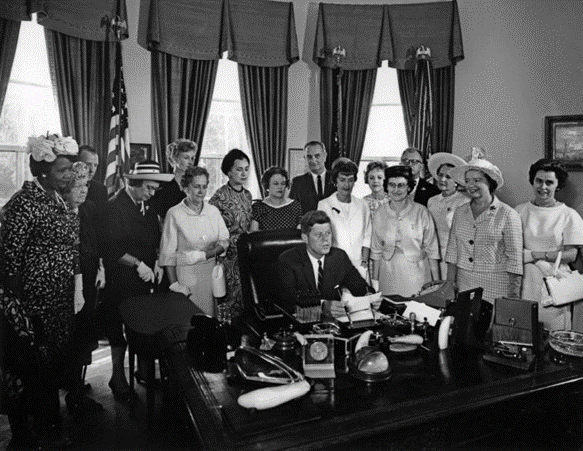Published: September 16, 2024
Resources on the theme of "Rights and Responsibilities in History"

National History Day® (NHD) is a non-profit education organization established in 1974 that provides educational programs helping students and teachers influence the future through discovery of the past. The National History Day® Contest is a year-long academic program focused on historical research, interpretation, and creative expression for 6th to 12th-grade students. The experience ends with a series of contests at the local and affiliate levels and an annual national competition in the nation's capital in June.
The 2024-2025 theme is “Rights and Responsibilities in History.” NHD states, "The relationship between rights and responsibilities is crucial to maintaining a just and functioning society. While citizens enjoy certain rights that protect their freedoms, they also bear responsibilities to one another. Rights are freedoms or privileges that individuals possess as human beings or as citizens of a society and responsibilities are expectations of individuals as members of society." Source: National History Day®
GPO's GovInfo provides access to a wealth of official publications from all three branches of the Federal Government to assist students and educators with their project research. In addition to viewing the resources linked on this page, be sure to:
- Check out What’s Available to see publications by collection and examples of content, and
- Head to the Tutorials and Handouts page for information that will help guide students through the search process.
Samples of Content on GovInfo Related to This Year's Theme
United States Congressional Serial Set
The United States Congressional Serial Set, commonly referred to as
the Serial Set, is a compilation of all numbered House and Senate reports and documents, including executive reports and treaty documents, issued for each session of Congress. Documenting events of the U.S. Congress over the years, the Serial Set is one of the Nation’s most treasured publications. The U.S. Government Publishing Office (GPO), in collaboration with the Law Library of Congress, has started a large multi-year effort to digitize and make accessible volumes of the U.S. Congressional Serial Set back to the first volume, which was published in 1817. Check
out the U.S. Congressional Serial Set - Browse
by Topic page for a wide selection of publications related to this year's theme.
United States Constitution
The Constitution of the United States of America: Analysis and Interpretation — Contains analysis and interpretation of the U.S. Constitution with in-text annotations of cases decided by the Supreme Court.
- Search using your chosen criteria over the Constitution Annotated publication from the Advanced Search box.
S. Doc 116-3 - Constitution of the United States and the Declaration of Independence, Pocket Edition

(Cover Image: Constitution of the United States and the Declaration of Independence, Pocket Edition)
Sample Searches Relating to Keywords for U.S. Constitutional Amendments
Compilation of Presidential Documents — This collection is composed of the daily compilation of Presidential documents. It includes such material as proclamations, speeches, and press conferences, to name a few.
Congressionally Mandated Reports (Browse by Topic) — Reports that are required by statute to be submitted by Federal agencies to the Senate, the House of Representatives, or to congressional committees or subcommittees.
Congressional Bills — Congressional bills are legislative proposals from the House of Representatives and Senate within the United States Congress.
Congressional Committee Prints — Congressional Committee Prints are publications issued by Congressional Committees that include topics related to their legislative or research activities, as well as other matters such as memorial tributes.
Congressional Documents — The Congressional Documents collection consists of House and Senate documents, Senate Executive documents, and Senate Treaty documents.
Congressional Hearings — A hearing is a meeting or session of a Senate, House, joint, or special committee of Congress, usually open to the public, to obtain information and opinions on proposed legislation, conduct an investigation, or evaluate/oversee the activities of a government department or the implementation of a Federal law.
Congressional Record — The official record of the proceedings and debates of the United States Congress. See issues prior to 1994 in the Bound Congressional Record. At the end of each session of Congress, all of the daily Congressional Record editions are collected, re-paginated, and re-indexed into a permanent, bound edition.
Congressional Reports — Congressional reports originate from congressional committees and deal with proposed legislation and issues under investigation.
Federal Register — Provides a uniform system for making regulations and legal notices issued by Federal agencies available to the public. The public can participate and impact Federal rules and regulations at www.regulations.gov. In addition, FederalRegister.gov, an HTML edition of the Federal Register, is available from the Office of the Federal Register (OFR), National Archives and Records Administration (NARA). Finally, the Electronic Code of Federal Regulations (eCFR), a currently updated, unofficial version of the Code of Federal Regulations, is also available.
Journal of the House of Representatives —The official record of proceedings of each legislative day in the House of Representatives.
Journal of the Senate of the United States — The official record of proceedings of the Senate of the United States, and is published pursuant to the Constitution of the United States (Art. I, Sec. 5) under the direction of the Secretary of the Senate.
Presidential Inaugural Addresses — This resource is comprised of a listing of inaugural addresses given by presidents upon assuming office.
Public and Private Laws — Public and private laws are also known as slip laws. A slip law is an official publication of the law and is competent evidence admissible in all state and Federal courts and tribunals of the United States. Public laws affect society as a whole, while private laws affect an individual, family, or small group.
Public Papers of the President — Each Public Papers volume contains the papers and speeches of the President of the United States that were issued by the Office of the Press Secretary during the specified time period.
United States Statutes at Large — The United States Statutes at Large, typically referred to as the Statutes at Large, is the permanent collection of all laws and resolutions enacted during each session of Congress.
Statute Compilations — The Office of the Legislative Counsel of the U.S. House of Representatives maintains a corpus of Statute Compilations of public laws that either do not appear in the U.S. Code or that have been classified to a title of the U.S. Code that has not been enacted into positive law. Each Statute Compilation incorporates the amendments made to the underlying statute since it was originally enacted.
United States Code — The United States Code is the codification by subject matter of the general and permanent laws of the United States.
United States Courts Opinions — Provide public access to opinions from selected United States appellate, district, and bankruptcy courts.
 AR7965-B 10 June 1963 Bill signing– S. 1409 Equal Pay Act, 11:45 AM. Credit: “Abbie Rowe. White House Photographs. John F. Kennedy Presidential Library and Museum, Boston
AR7965-B 10 June 1963 Bill signing– S. 1409 Equal Pay Act, 11:45 AM. Credit: “Abbie Rowe. White House Photographs. John F. Kennedy Presidential Library and Museum, Boston
Samples of Legislation, Documents and Searches
Age Discrimination in Employment Act of 1975*
Americans with Disabilities Act of 1990*
Congressional Hearings on human rights topics
How Our Laws are Made, H. Doc. 110-49
Human Rights and Societal Obligations
Kappler’s Indian Affairs: Laws and Treaties — Compiled and edited by Charles J. Kappler, this historically significant, seven volume compilation contains U.S. treaties, laws and executive orders pertaining to Native American Indian tribes.
Report on Voting Rights and Election Administration in the United States of America
Senate Executive Documents/Senate Treaty Documents — Senate Executive Documents are reports made to the Senate by the executive branch and in 1981 they became known as Senate Treaty Documents. These documents contain the full text of the treaties.
Social Responsibility and Fundamental Rights
U.S. Court Opinions from cases on civil rights
U.S. Presidential proclamations in support of Human Rights Day or Week
Title IX of the Education Amendments of 1972 prohibits sex discrimination in education programs.
*This links to a Statute Compilation, which is a compilation of the public law, as amended, and is an unofficial document and should not be cited as legal evidence of the law. Learn more.
 Mrs. Eleanor Roosevelt of the United States, chair of the drafting committee, holding a Universal Declaration of Human Rights poster in English. UN Photo (1949) Source: United Nations
Mrs. Eleanor Roosevelt of the United States, chair of the drafting committee, holding a Universal Declaration of Human Rights poster in English. UN Photo (1949) Source: United Nations
Samples of Featured Content Articles
Constitution Day and Citizenship Day
175th Anniversary of the Seneca Falls Convention
60th Anniversary of the Civil Rights Act of 1964
Other Resources
View a list of external resource and websites.